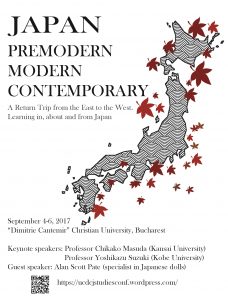 In 2010, four friends and colleagues got together and came up with the idea to organize a Japanese Studies conference at the “Dimitrie Cantemir” Christian University in Bucharest, Romania. Two of them live and work in Japan (Kyoto University and Kobe University), and the other two are the heart and soul of the Japanese language department at said university. The idea had been floating around for a while, but they decided that the time was right and… just did it. They talked about it, came up with a concept, applied for funding and organized the first conference in 2011. From the get-go, the idea was to create a wide network of knowledge about Japan and Japanese Studies (literature, culture, history, linguistics, etc), which would bring together young, as well as experienced Japanese and Asian experts, researchers from established Japanology schools in Western Europe and the United States, and scholars from emerging centers for Asian studies in Eastern Europe.
In 2010, four friends and colleagues got together and came up with the idea to organize a Japanese Studies conference at the “Dimitrie Cantemir” Christian University in Bucharest, Romania. Two of them live and work in Japan (Kyoto University and Kobe University), and the other two are the heart and soul of the Japanese language department at said university. The idea had been floating around for a while, but they decided that the time was right and… just did it. They talked about it, came up with a concept, applied for funding and organized the first conference in 2011. From the get-go, the idea was to create a wide network of knowledge about Japan and Japanese Studies (literature, culture, history, linguistics, etc), which would bring together young, as well as experienced Japanese and Asian experts, researchers from established Japanology schools in Western Europe and the United States, and scholars from emerging centers for Asian studies in Eastern Europe.
After the first edition, things didn’t go as planned in the next two years, so they took some time off to regroup and rethink the whole thing. They came back with a vengeance in 2014, organizing the second conference with no funds other than what the university offered – what a feat! In 2015, the four became five as I joined the team as a co-organizer, and this year we just put together the 5th conference.
Working together to set up a conference, especially when you’re thousands of miles apart on the map and 6-7 hours apart on the clock, is no easy task. We are all friends and colleagues – four of us were classmates in university, so we have known each other for almost 20 years, while the fifth has been working with (some of) us for 10 years – but there will always be the unfortunate misunderstanding or the unavoidable lateness in replying. But we did it, we worked together very well and I think we managed to put together a good conference, with 40 presenters from more than 10 countries, with excellent keynote speeches and with two workshops for undergrads – you can check out all the details on our blog.
But the most exciting about this conference is the fact that there were many young researchers – especially from Romania, but not only – who applied and came to make presentations. This means – for me, at least – that we managed to create a place where people feel good, where they like to get together and exchange ideas. And it made me feel a little bit more optimistic about the future of Japanese studies in my home country.